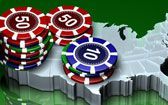Introduction
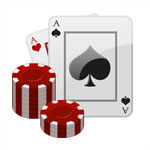 Players jumping into online poker games will enjoy an amazing poker experience. With cash and tournament games running around the clock, there's ample opportunity to get to the tables and play a wide variety of games.
Players jumping into online poker games will enjoy an amazing poker experience. With cash and tournament games running around the clock, there's ample opportunity to get to the tables and play a wide variety of games.
For new poker players logging in for the first time, we have outlined some handy tips below to make the transition from playing live to online a little easier. Even if you're a grizzled veteran of the online Hold'em tables, there are some great tips for you too.
1. Always Find a Great Welcome Bonus
Whenever you are looking around for a new site to play at, always shop around.
 Don't just settle on playing at the same site your buddy plays at, because you don't really know if he did his homework when he signed up. The best bit of advice we can give you is to look at the recommended poker sites we've featured here on our pages. They've been audited by our staff and one of the major factors we rate them on is the quality of the welcome bonuses they offer. Remember, it's not just about the amount (although that's very important) but also the level of ease it is to unlock that bonus.
Don't just settle on playing at the same site your buddy plays at, because you don't really know if he did his homework when he signed up. The best bit of advice we can give you is to look at the recommended poker sites we've featured here on our pages. They've been audited by our staff and one of the major factors we rate them on is the quality of the welcome bonuses they offer. Remember, it's not just about the amount (although that's very important) but also the level of ease it is to unlock that bonus.
The two major factors to properly evaluate a bonus are the size of the bonus and how the site allows players to unlock that bonus. It's no good playing through a 100% bonus of $400 if you are left waiting for months to get the money out. Sticking with one of our recommended sites will avoid any huge headaches, as all our top sites offer solid bonuses.
2. Find a Reliable Poker Site
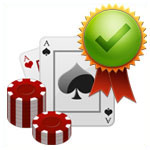 It goes without saying that hunting out a safe, secure site is paramount to your online poker future.
It goes without saying that hunting out a safe, secure site is paramount to your online poker future.
Over the years, many poker sites have come and gone. Solid companies have stuck around because they offer a secure environment and fulfill their obligations as a poker operator. Others, however, are less than reputable, and without firm regulations in place there are no consumer guarantees.
Fortunately, we've already done the homework for our players by independently auditing all sites that offer games to players in the United States. We rank each based on the quality of service they provide and only feature reliable sites for players to play on. By not playing at a reliable site, players are putting their bankrolls at risk.
3. Know When to Hold'em and When to Fold'em
'Poker takes a minute to learn but a lifetime to master,' goes the well-worn cliche.

And like Kenny Rogers says in his classic song, you need to know when to hold on to a great hand and when to release a bad one. As simple as this advice is, it often falls on new players' deaf ears. A lot of newbies at the tables think the game is only about out-bluffing opponents, regardless of what they are dealt. This is exactly the type of behavior good players are hoping for!
It seems simple but the best advice for new Texas Hold'em players starting out is to only play strong hands, and play them in a good position, eventually opening up their opening hand when seated in worse table positions.
Even a new player can make a lot of money at the micro and small stakes games online by playing a tight, solid, ABC game. If it's a good hand and a good situation, play it. If you know you are beat and the other guy isn't going to fold, just muck your hand to fight another day.
4. Learn more poker variants
Think that all the money is in Texas Hold'em? Think again. If you're going to expand your knowledge, and your wallet, you'll need to learn some different games.
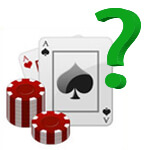 If you were to ask a high level professional poker player one thing they would change about their poker career, it's that they would have learned a different poker variant early in their career.
If you were to ask a high level professional poker player one thing they would change about their poker career, it's that they would have learned a different poker variant early in their career.
While Texas Hold'em is still a popular and profitable game, there are many other great poker games that hold a bigger edge for good players. Omaha games, particularly Pot Limit Omaha played in cash games, are generally the next step on the ladder for Hold'em players looking to try something new, and it remains a game that many players are interested in trying but not interested in getting any good at.
Playing online poker makes learning other poker variants like Omaha, Stud or Razz extremely easy, as there tends to be a lot of games about, and a lot of players who have absolutely no clue what they're doing (yep, even more than in Hold'em). Don't make the mistake of classing yourself as a one-trick pony, because other games might be better suited to your talents. Not only that, but the 'harder' games offer much greater potential for making money online if you hunt out the fish well enough.
5. Find Weaker Players
One mistake that new online poker players make, after having some success at the tables, is to avoid fishy tables and attack the regulars in an attempt to improve their game.

While this might be counter-intuitive to some, it makes sense to others. After a few months of marginal financial gains, these players eventually see the light and realize that poker's about making money, not improving self-esteem.
Our advice is to always find tables with plenty of fish on in order to maximize your potential earnings during a session. You'll know who they are - they're either folding way too much, entering too many pots with garbage, chasing miracle one-outers, or over-betting pots 9 times out of 10. Chances are there will be a reg or two at the table anyways so there's no need to actively find tables with all strong players on just in order to improve. Find the fish, exploit them, and make lots of money.
6. Don't Gamble What You Can't Afford to Lose
Another major flaw with most beginners is failing to adhere to strict bankroll management rules.

Unfortunately, this is also a mistake that seasoned veterans make too.
Never get into a poker game that you can't afford. The best advice is to set aside a certain amount of money and create yourself a separate bankroll from your regular funds. Once you are ready to dive into poker, only use those funds and never dip into your main "life" assets.
As a rule, try not to get into cash games where you do not have at least 20 buy-ins set aside, particularly if you're multitabling. For tournaments, the general rule of thumb is to have anywhere from 50-100 buy-ins set aside so you can handle the swings.
7. Walk Away When You Are Angry
Playing when angry, also known as being on tilt, is one of the worst things a player can do.
 There are so many different forms of tilt that there are multiple books on the subject, but the end result is always the same - players never play their 'A game' when they are angry. If you find yourself cursing out loud, or feeling the temperature rise beneath the collar, just get up and take a break. Going for a walk or just blowing off some steam can be a major difference to how well as session will go. Most people will know when they are angry, but very few have the fortitude to do something about it.
There are so many different forms of tilt that there are multiple books on the subject, but the end result is always the same - players never play their 'A game' when they are angry. If you find yourself cursing out loud, or feeling the temperature rise beneath the collar, just get up and take a break. Going for a walk or just blowing off some steam can be a major difference to how well as session will go. Most people will know when they are angry, but very few have the fortitude to do something about it.
8. Don't Play More Tables Than You Are Comfortable With
Not every poker player is destined to crush 24 tables simultaneously. In fact, while the industry popularizes and glamorizes multi-tabling, it rarely cautions players about playing in too many games at once.
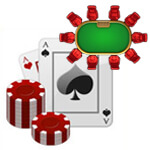 Learn to master one or two tables first - and we mean actually profit from them - before adding one or two more. Over time - and a bunch more hands - you should see your concentration improving and hopefully your profits rising. If you find yourself at too many tables at once, you will not only be timing out of hands (instantly folding) but you will undoubtedly be playing sub-optimal poker. Not only that, but good players will spot a multitabler a mile away and, knowing that you're not paying 100 percent concenctration, exploit you to the max.
Learn to master one or two tables first - and we mean actually profit from them - before adding one or two more. Over time - and a bunch more hands - you should see your concentration improving and hopefully your profits rising. If you find yourself at too many tables at once, you will not only be timing out of hands (instantly folding) but you will undoubtedly be playing sub-optimal poker. Not only that, but good players will spot a multitabler a mile away and, knowing that you're not paying 100 percent concenctration, exploit you to the max.
9. Be Careful When Moving Up Stakes
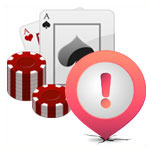 At some point, every poker player, be they at the micro, small or medium stakes, looks at the level above and plans their mega assault up the poker ladder.
At some point, every poker player, be they at the micro, small or medium stakes, looks at the level above and plans their mega assault up the poker ladder.
Oftentimes this is met with anxiety since players typically double the stakes when they move up and psych themselves out when they get involved in the first few sessions at the new stakes.
Being able to have the right mental state is key when moving up. Only when you're completely comfortable with one level should you think about moving up one. Also, bankroll management will be absolutely necessary to make the transition a smooth one. The same principles remain in place as players should be properly bankrolled once they move up and know what their limits are should they need to move back down.
10. Look for Patterns in Your Opponents
The major difference between a winning poker player and a losing poker player is the ability to read an opponent.
 Some players just play the two cards in front of them and rarely pay attention to anything else. Smart players, however, are constantly watching the action - even if they aren't in the hand - in order to pick up tells on other players.
Some players just play the two cards in front of them and rarely pay attention to anything else. Smart players, however, are constantly watching the action - even if they aren't in the hand - in order to pick up tells on other players.
It's shocking how bad some people are about giving away their hand. Some players make unconscious (but consistent) movements or sounds when they have a strong or weak hand. Others might make betting patterns that can be deciphered to show if they are bluffing or are strong. Either way, a good poker player is always paying attention, looking for patterns and then figuring out a way to exploit those patterns for an advantage.
This happens online as well. Players can show online 'tells' that gives away whether they're reckless, paying attention (or not), or holding the nuts. Only regular play will help you master these telltale signs.
 Players jumping into online poker games will enjoy an amazing poker experience. With cash and tournament games running around the clock, there's ample opportunity to get to the tables and play a wide variety of games.
Players jumping into online poker games will enjoy an amazing poker experience. With cash and tournament games running around the clock, there's ample opportunity to get to the tables and play a wide variety of games.
 Don't just settle on playing at the same site your buddy plays at, because you don't really know if he did his homework when he signed up. The best bit of advice we can give you is to look at the recommended poker sites we've featured here on our pages. They've been audited by our staff and one of the major factors we rate them on is the quality of the
Don't just settle on playing at the same site your buddy plays at, because you don't really know if he did his homework when he signed up. The best bit of advice we can give you is to look at the recommended poker sites we've featured here on our pages. They've been audited by our staff and one of the major factors we rate them on is the quality of the  It goes without saying that hunting out a safe, secure site is paramount to your online poker future.
It goes without saying that hunting out a safe, secure site is paramount to your online poker future.
 If you were to ask a high level professional poker player one thing they would change about their poker career, it's that they would have learned a different poker variant early in their career.
If you were to ask a high level professional poker player one thing they would change about their poker career, it's that they would have learned a different poker variant early in their career.

 There are so many different forms of tilt that there are multiple books on the subject, but the end result is always the same - players never play their 'A game' when they are angry. If you find yourself cursing out loud, or feeling the temperature rise beneath the collar, just get up and take a break. Going for a walk or just blowing off some steam can be a major difference to how well as session will go. Most people will know when they are angry, but very few have the fortitude to do something about it.
There are so many different forms of tilt that there are multiple books on the subject, but the end result is always the same - players never play their 'A game' when they are angry. If you find yourself cursing out loud, or feeling the temperature rise beneath the collar, just get up and take a break. Going for a walk or just blowing off some steam can be a major difference to how well as session will go. Most people will know when they are angry, but very few have the fortitude to do something about it. Learn to master one or two tables first - and we mean actually profit from them - before adding one or two more. Over time - and a bunch more hands - you should see your concentration improving and hopefully your profits rising. If you find yourself at too many tables at once, you will not only be timing out of hands (instantly folding) but you will undoubtedly be playing sub-optimal poker. Not only that, but good players will spot a multitabler a mile away and, knowing that you're not paying 100 percent concenctration, exploit you to the max.
Learn to master one or two tables first - and we mean actually profit from them - before adding one or two more. Over time - and a bunch more hands - you should see your concentration improving and hopefully your profits rising. If you find yourself at too many tables at once, you will not only be timing out of hands (instantly folding) but you will undoubtedly be playing sub-optimal poker. Not only that, but good players will spot a multitabler a mile away and, knowing that you're not paying 100 percent concenctration, exploit you to the max. At some point, every poker player, be they at the micro, small or medium stakes, looks at the level above and plans their mega assault up the poker ladder.
At some point, every poker player, be they at the micro, small or medium stakes, looks at the level above and plans their mega assault up the poker ladder. Some players just play the two cards in front of them and rarely pay attention to anything else. Smart players, however, are constantly watching the action - even if they aren't in the hand - in order to pick up tells on other players.
Some players just play the two cards in front of them and rarely pay attention to anything else. Smart players, however, are constantly watching the action - even if they aren't in the hand - in order to pick up tells on other players.


